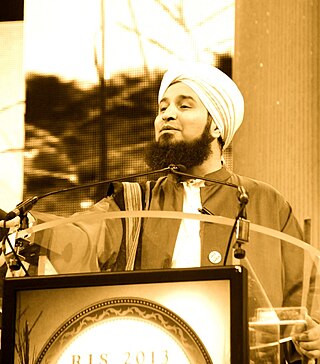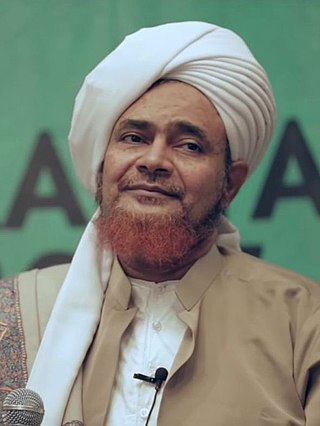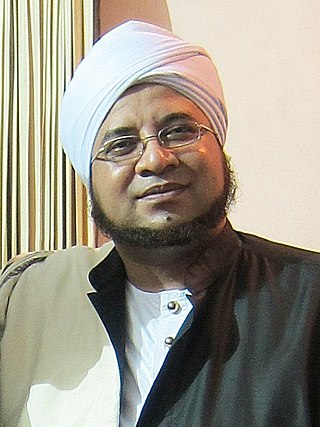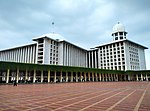Related Research Articles

The Tijani order is a Sufi order of Sunni Islam named after Ahmad al-Tijani. It originated in the Maghreb but now more widespread in West Africa, particularly in Senegal, Gambia, Mauritania, Mali, Guinea, Niger, Chad, Ghana, Northern and Southwestern Nigeria and some parts of Sudan. The Tijāniyyah order is also present in the states of Kerala, Tamil Nadu and Karnataka in India. Its adherents are called Tijānī. Tijānīs place great importance on culture and education and emphasize the individual adhesion of the disciple (murid). To become a member of the order, one must receive the Tijānī wird, or a sequence of holy phrases to be repeated twice daily, from a muqaddam, or representative of the order.

Habib, sometimes written as Habeeb, is an Arabic masculine given name, occasional surname, and honorific, with the meaning "beloved" or "my love", or "darling". It also forms the famous Arabic word ‘Habibi’ which is used to refer to a friend or a significant other in the aspect of love or admiration.
Abū Hurayra ʿAbd al-Raḥmān ibn Ṣakhr al-Dawsī al-Zahrānī, commonly known as Abū Hurayra, was a companion of the Islamic prophet Muhammad and the most prolific hadith narrator in Sunni Islam.
Ṭalḥa ibn ʿUbayd Allāh al-Taymī was a companion of the Islamic prophet Muhammad. In Sunni Islam, he is mostly known for being among al-ʿashara al-mubashshara. He played an important role in the Battle of Uhud and the Battle of the Camel, in which he died. According to Sunnis, he was given the title "the Generous" by Muhammad.
Salawat or durood is an Islamic complimentary Arabic phrase which contains veneration for Muhammad. This phrase is usually expressed by Muslims as part of their five daily prayers and also when Muhammad's name is mentioned.

The Ba'Alawi tariqa, also known as the Tariqa Ba Alawiyya is a Sufi order centered in Hadhramawt, Yemen, but now spread across the Indian Ocean rim along with the Hadhrami diaspora. The order is closely tied to the Ba'Alawi sadah family.
Islam is an Abrahamic monotheistic religion teaching that there is only one God (Allah) and that Muhammad is His last Messenger.

Habib Ali Zain al-Abidin al-Jifri is a Yemeni Sunni Islamic scholar and spiritual educator based in the United Arab Emirates. He is the founder of Tabah Foundation, a research institute based in Abu Dhabi, UAE. He is a direct descendant of the Islamic Prophet Muhammad.
Ali al-Uraydi ibn Ja'far al-Sadiq, better known simply as Ali al-Uraydi, was the son of Ja'far al-Sadiq and the brother of Isma'il, Musa al-Kazim, Abdullah al-Aftah, and Muhammad Al-Dibaj. He was known by the title al-Uraydi, because he lived in an area called Urayd, about 4 miles from Medina. He was also known by the nickname Abu al-Hasan.

The Hadharem or the Hadhrami are an Arab sub-ethnic group indigenous to the Hadhramaut region in South Arabia, which is part of modern-day eastern Yemen and their own dialect, Hadhrami Arabic. Among the two million inhabitants of Hadhramaut, there are about 1,300 distinct tribes.

Habib Umar bin Hafiz is a Yemeni Sunni and Sufi Islamic scholar, teacher, and founder and dean of Dar al-Mustafa Islamic seminary. He also a member of the Supreme Advisory Council for the Tabah Foundation in Abu Dhabi.

Habib Munzir bin Fuad Al-Musawa was an Indonesian Islamic cleric, teacher, da'i and founder of the Majelis Rasulullah religious organization.

Ali bin Abdurrahman al-Habshi, better known as Habib Ali of Kwitang or Habib Ali Kwitang, was one of the leading Islamic clerics and preachers in Jakarta in the 20th century. He was also the founder and chairman of the Majelis Taklim Kwitang and Islamic Center Indonesia, which are the forerunners of other religious organizations in Jakarta.
February 2017 Jakarta protests refer to a series of mass protest led by Islamist movements which took place on 11 February 2017 and 21 February 2017 in Jakarta, Indonesia, and dubbed as the Action 112 and the Action 212 respectively. The protests were aimed against the incumbent governor of Jakarta Special Capital Region Basuki Tjahaja Purnama for an alleged blasphemy of the Quran, the Islamic holy book.

Abuya Kyai Hajji Ahmad Muhtadi bin Dimyathi al-Bantani or better known as Abuya Muhtadi is an Indonesian Muslim cleric from Banten. He is known as one of the Muslim scholars close to President Joko Widodo. At the Zikir Kebangsaan which was first held by the Indonesian government in the Merdeka Palace in 2017, Muhtadi was one of the religious leaders invited by the president. In the 2019 Indonesian presidential election, he supported a friend who was also a Muslim cleric from Banten, Ma'ruf Amin, who became the running mate of incumbent presidential candidate, Joko Widodo. Even so, in the 2014 Indonesian presidential election, he supported Prabowo Subianto as a candidate for Indonesian President and instructed his students to vote for Subianto.

Sheikh Sulaiman ar-Rasuli, known as Inyiak Canduang, was an Indonesian ʿālim and founder of Union of Islamic Education, a kaum tua (traditionalist) Islamic organization from West Sumatra. He was credited for popularizing the famous Minangkabau idiom, adat basandi syarak, syarak basandi Kitabullah.
The Fifith Extraordinary Session of the Islamic Summit Conference was held from 6–7 March 2016 in Jakarta, Indonesia. The heads of the 57 member countries of the Organization of Islamic Cooperation (OIC), including notable figures such as the Vice President of Indonesia, Muhammad Jusuf Kalla, and Sudan’s President Omar al-Bashir participated in the summit. The conference aimed to address various pressing issues affecting the Muslim world, including internal and external conflicts in the Middle East, radicalism, and current terrorism. The summit also reaffirmed support for Palestine and called for an international ban on products from Israeli settlements in the West Bank.
References
- Wulandari, H. (2014). Religion Industrial Complex in Indonesia. North Carolina: Lulu Press, Inc.
- Yopan, M. and Saksono, P.B. (2012). E-Commerce Development of Kios Nabawi of Majelis Rasulullah. The Indonesian Journal of Business Administration, 1(2), 93-98.
- Zamhari, A. and Howell, J.D. (2012). Taking Sufism to the streets: 'Majelis zikir' and 'majelis salawat' as new venues for popular Islamic piety in Indonesia. Review of Indonesian and Malaysian Affairs, 46(2), 47-75.
